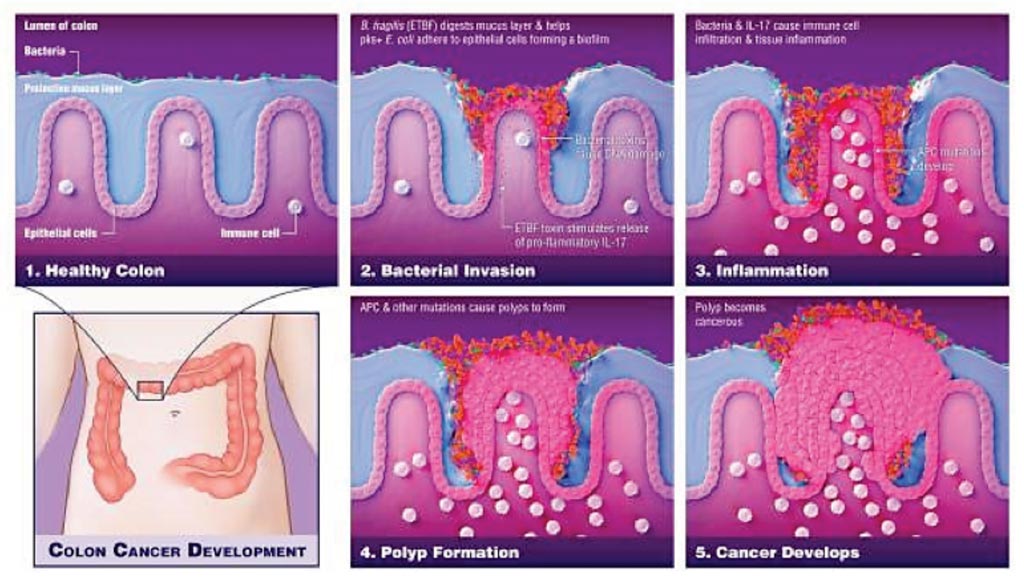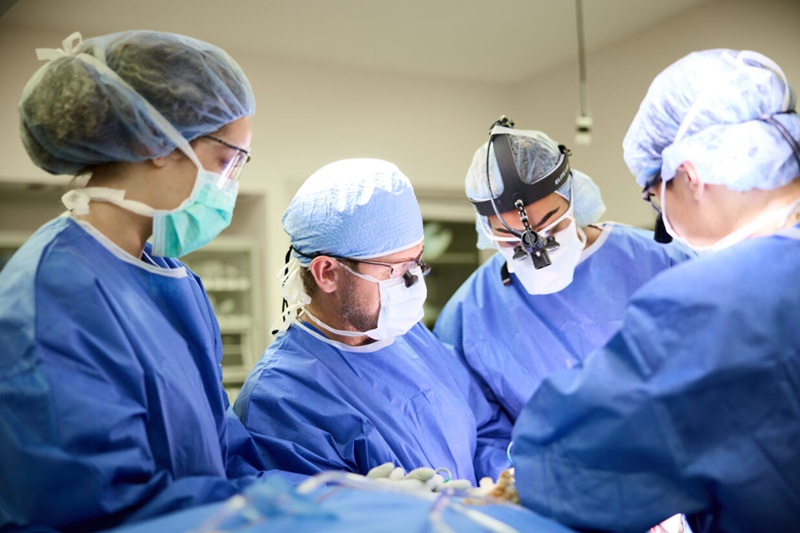Bacteria Play Critical Role in Driving Colon Cancers
|
By LabMedica International staff writers Posted on 12 Feb 2018 |

Image: Diagram of how bacteria play a critical role in the development of colon cancer (Photo courtesy of Elizabeth Cook).
Patients with an inherited form of colon cancer harbor two bacterial species that collaborate to encourage development of the disease, and the same species have been found in people who develop a sporadic form of colon cancer.
A process has been elucidated in which these bacteria invade the protective mucus layer of the colon and collude to create a microenvironment, complete with nutrients and everything the bacteria need to survive, that induces chronic inflammation and subsequent DNA damage that supports tumor formation.
Scientists at Johns Hopkins Medicine (Baltimore, MD, USA) and their collaborators investigated the relationship between the bacteria-caused biofilms and cancer formation, by examining colon tissue removed from six familial adenomatous polyposis (FAP) patients. About 5% of colon cancers are caused by a hereditary syndrome FAP, in which an inherited mutation launches a series of genetic changes that develop over time and eventually prompt the epithelial cells to turn malignant.
The team identified patchy bacterial biofilms composed predominately of Escherichia coli and Bacteroides fragilis. Genes for colibactin (clbB) and Bacteroides fragilis toxin (bft), encoding secreted oncotoxins, were highly enriched in FAP patients’ colonic mucosa compared to healthy individuals. Bacteroides fragilis and Escherichia coli, a surprising finding since the colon contains at least 500 different types of bacteria. Tests on 25 additional colon samples from FAP patients showed that the B. fragilis strain was a subtype, called ETBF, which makes a toxin that triggers certain oncogenic, or cancer-promoting, pathways in colon epithelial cells and causes colon inflammation.
The results revealed that ETBF's toxin spurs a cascade of events that promote colon inflammation that feeds back to act on the colon epithelial cells. First, the toxin triggers colon immune cells to produce interleukin-17 (IL-17). This inflammatory molecule then acts directly on the colon epithelial cells to trigger activation of a protein complex involved in promoting further inflammation, known as nuclear factor kappa-light-chain-enhancer of activated B cells (NFκB). NFκB in turn induces the colon epithelial cells to produce several signaling molecules that recruit more immune cells, called myeloid cells, to the colon.
In addition to IL-17, the studies showed that ETBF digested the mucus layer, enabling the polyketide synthases positive (pks+) E. coli to adhere in larger numbers to the colon mucosa where together the bacteria induced increased DNA damage, a step preceding the gene mutations that underlie colon tumor formation. The study was published on February 2, 2018, in the journal Science.
Related Links:
Johns Hopkins Medicine
A process has been elucidated in which these bacteria invade the protective mucus layer of the colon and collude to create a microenvironment, complete with nutrients and everything the bacteria need to survive, that induces chronic inflammation and subsequent DNA damage that supports tumor formation.
Scientists at Johns Hopkins Medicine (Baltimore, MD, USA) and their collaborators investigated the relationship between the bacteria-caused biofilms and cancer formation, by examining colon tissue removed from six familial adenomatous polyposis (FAP) patients. About 5% of colon cancers are caused by a hereditary syndrome FAP, in which an inherited mutation launches a series of genetic changes that develop over time and eventually prompt the epithelial cells to turn malignant.
The team identified patchy bacterial biofilms composed predominately of Escherichia coli and Bacteroides fragilis. Genes for colibactin (clbB) and Bacteroides fragilis toxin (bft), encoding secreted oncotoxins, were highly enriched in FAP patients’ colonic mucosa compared to healthy individuals. Bacteroides fragilis and Escherichia coli, a surprising finding since the colon contains at least 500 different types of bacteria. Tests on 25 additional colon samples from FAP patients showed that the B. fragilis strain was a subtype, called ETBF, which makes a toxin that triggers certain oncogenic, or cancer-promoting, pathways in colon epithelial cells and causes colon inflammation.
The results revealed that ETBF's toxin spurs a cascade of events that promote colon inflammation that feeds back to act on the colon epithelial cells. First, the toxin triggers colon immune cells to produce interleukin-17 (IL-17). This inflammatory molecule then acts directly on the colon epithelial cells to trigger activation of a protein complex involved in promoting further inflammation, known as nuclear factor kappa-light-chain-enhancer of activated B cells (NFκB). NFκB in turn induces the colon epithelial cells to produce several signaling molecules that recruit more immune cells, called myeloid cells, to the colon.
In addition to IL-17, the studies showed that ETBF digested the mucus layer, enabling the polyketide synthases positive (pks+) E. coli to adhere in larger numbers to the colon mucosa where together the bacteria induced increased DNA damage, a step preceding the gene mutations that underlie colon tumor formation. The study was published on February 2, 2018, in the journal Science.
Related Links:
Johns Hopkins Medicine
Latest Pathology News
- Engineered Yeast Cells Enable Rapid Testing of Cancer Immunotherapy
- First-Of-Its-Kind Test Identifies Autism Risk at Birth
- AI Algorithms Improve Genetic Mutation Detection in Cancer Diagnostics
- Skin Biopsy Offers New Diagnostic Method for Neurodegenerative Diseases
- Fast Label-Free Method Identifies Aggressive Cancer Cells
- New X-Ray Method Promises Advances in Histology
- Single-Cell Profiling Technique Could Guide Early Cancer Detection
- Intraoperative Tumor Histology to Improve Cancer Surgeries
- Rapid Stool Test Could Help Pinpoint IBD Diagnosis
- AI-Powered Label-Free Optical Imaging Accurately Identifies Thyroid Cancer During Surgery
- Deep Learning–Based Method Improves Cancer Diagnosis
- ADLM Updates Expert Guidance on Urine Drug Testing for Patients in Emergency Departments
- New Age-Based Blood Test Thresholds to Catch Ovarian Cancer Earlier
- Genetics and AI Improve Diagnosis of Aortic Stenosis
- AI Tool Simultaneously Identifies Genetic Mutations and Disease Type
- Rapid Low-Cost Tests Can Prevent Child Deaths from Contaminated Medicinal Syrups
Channels
Clinical Chemistry
view channel
New PSA-Based Prognostic Model Improves Prostate Cancer Risk Assessment
Prostate cancer is the second-leading cause of cancer death among American men, and about one in eight will be diagnosed in their lifetime. Screening relies on blood levels of prostate-specific antigen... Read more
Extracellular Vesicles Linked to Heart Failure Risk in CKD Patients
Chronic kidney disease (CKD) affects more than 1 in 7 Americans and is strongly associated with cardiovascular complications, which account for more than half of deaths among people with CKD.... Read moreMolecular Diagnostics
view channel
Abdominal Fluid Testing Can Predict Ovarian Cancer Progression
Ovarian cancer kills more women than any other gynecological cancer, largely because it is usually diagnosed only after it has spread widely within the abdomen. Unlike many other cancers, it does not rely... Read more
POC Test Uses Fingerstick Blood, Serum, Or Plasma Sample to Detect Typhoid Fever
Typhoid fever is an acute febrile illness caused by Salmonella enterica serovar Typhi (S. Typhi) and affects an estimated 11–21 million people globally each year, resulting in approximately 128,000–161,000... Read more
Rapid Testing Panel Simultaneously Detects 15 Drugs of Abuse in Urine Within 21 Minutes
Illicit drug use and excessive use of prescription medicine is growing across the US amid a severe opioid crisis. Although overdose fatalities were reported to have declined by nearly 27% in 2024, many... Read moreHematology
view channel
New Guidelines Aim to Improve AL Amyloidosis Diagnosis
Light chain (AL) amyloidosis is a rare, life-threatening bone marrow disorder in which abnormal amyloid proteins accumulate in organs. Approximately 3,260 people in the United States are diagnosed... Read more
Fast and Easy Test Could Revolutionize Blood Transfusions
Blood transfusions are a cornerstone of modern medicine, yet red blood cells can deteriorate quietly while sitting in cold storage for weeks. Although blood units have a fixed expiration date, cells from... Read more
Automated Hemostasis System Helps Labs of All Sizes Optimize Workflow
High-volume hemostasis sections must sustain rapid turnaround while managing reruns and reflex testing. Manual tube handling and preanalytical checks can strain staff time and increase opportunities for error.... Read more
High-Sensitivity Blood Test Improves Assessment of Clotting Risk in Heart Disease Patients
Blood clotting is essential for preventing bleeding, but even small imbalances can lead to serious conditions such as thrombosis or dangerous hemorrhage. In cardiovascular disease, clinicians often struggle... Read moreImmunology
view channelBlood Test Identifies Lung Cancer Patients Who Can Benefit from Immunotherapy Drug
Small cell lung cancer (SCLC) is an aggressive disease with limited treatment options, and even newly approved immunotherapies do not benefit all patients. While immunotherapy can extend survival for some,... Read more
Whole-Genome Sequencing Approach Identifies Cancer Patients Benefitting From PARP-Inhibitor Treatment
Targeted cancer therapies such as PARP inhibitors can be highly effective, but only for patients whose tumors carry specific DNA repair defects. Identifying these patients accurately remains challenging,... Read more
Ultrasensitive Liquid Biopsy Demonstrates Efficacy in Predicting Immunotherapy Response
Immunotherapy has transformed cancer treatment, but only a small proportion of patients experience lasting benefit, with response rates often remaining between 10% and 20%. Clinicians currently lack reliable... Read moreMicrobiology
view channel
Comprehensive Review Identifies Gut Microbiome Signatures Associated With Alzheimer’s Disease
Alzheimer’s disease affects approximately 6.7 million people in the United States and nearly 50 million worldwide, yet early cognitive decline remains difficult to characterize. Increasing evidence suggests... Read moreAI-Powered Platform Enables Rapid Detection of Drug-Resistant C. Auris Pathogens
Infections caused by the pathogenic yeast Candida auris pose a significant threat to hospitalized patients, particularly those with weakened immune systems or those who have invasive medical devices.... Read moreTechnology
view channel
Robotic Technology Unveiled for Automated Diagnostic Blood Draws
Routine diagnostic blood collection is a high‑volume task that can strain staffing and introduce human‑dependent variability, with downstream implications for sample quality and patient experience.... Read more
ADLM Launches First-of-Its-Kind Data Science Program for Laboratory Medicine Professionals
Clinical laboratories generate billions of test results each year, creating a treasure trove of data with the potential to support more personalized testing, improve operational efficiency, and enhance patient care.... Read moreAptamer Biosensor Technology to Transform Virus Detection
Rapid and reliable virus detection is essential for controlling outbreaks, from seasonal influenza to global pandemics such as COVID-19. Conventional diagnostic methods, including cell culture, antigen... Read more
AI Models Could Predict Pre-Eclampsia and Anemia Earlier Using Routine Blood Tests
Pre-eclampsia and anemia are major contributors to maternal and child mortality worldwide, together accounting for more than half a million deaths each year and leaving millions with long-term health complications.... Read moreIndustry
view channel
WHX Labs in Dubai spotlights leadership skills shaping next-generation laboratories
WHX Labs in Dubai (formerly Medlab Middle East), held at Dubai World Trade Centre (DWTC) from 10–13 February, brings together international experts to discuss the factors redefining laboratory leadership,... Read moreNew Collaboration Brings Automated Mass Spectrometry to Routine Laboratory Testing
Mass spectrometry is a powerful analytical technique that identifies and quantifies molecules based on their mass and electrical charge. Its high selectivity, sensitivity, and accuracy make it indispensable... Read more
AI-Powered Cervical Cancer Test Set for Major Rollout in Latin America
Noul Co., a Korean company specializing in AI-based blood and cancer diagnostics, announced it will supply its intelligence (AI)-based miLab CER cervical cancer diagnostic solution to Mexico under a multi‑year... Read more
















